On 30 March, Afghan President Karzai leading a high-level delegation, left for Doha, Qatar to discuss bilateral ties, trade among other issues with the Qatari authorities. National Security Council advisor Rangin Spanta, High Peace Council (HPC) chairman Salahuddin Rabbani, were part of the officials accompanying Karzai on this trip.1
Also on Karzai’s agenda was to discuss the opening of a Taliban office in Doha. Karzai had previously opposed the opening of the office as he feared being bypassed in the Afghan peace negotiations and wanted the Qatari government to provide an assurance that they would close down the Taliban office if the Taliban did not open direct talks with the Afghan government within three months of opening of the office. An assurance Qatar was reluctant to provide as it already had unofficial Taliban presence in Doha since January 2012. The Taliban on its part refused to have direct contact with the Karzai government, calling him a Western puppet and said they will negotiate only with the US, which has in the past, much to Karzai’s frustrations, held secret talks with the US in Qatar.
Karzai’s present visit comes amidst a minor diplomatic row with Pakistan after a top Pakistani Foreign ministry official on 25 March, was quoted by the media as saying “Right now, Karzai is the biggest impediment to the (Afghan) peace process. In trying to look like a saviour, he is taking Afghanistan straight to hell.” The Pakistani bureaucrats also said that they were discouraged by Karzai’s erratic statements and provocations, probably designed to portray him as being very decisive in his dealings, back home in Afghanistan.
Given this context, Karzai’s visit was a significant effort to reach out to the Taliban. It is a virtual ‘leap of faith’ to precipitate the dealings with the Taliban as the countdown to the 2014 presidential and provincial elections in Afghanistan is on.
The recent success with US in securing the transfer of the Bagram prison and the withdrawal of US Special Forces from Wardak seems to have encouraged him. On 30 March, the security responsibilities of Nirkh district of Maidan Wardak province were handed over to the Afghan National Army (ANA). The ISAF, in a press release, confirmed security handover of Nirkh by the US Special Forces to their Afghan counterparts.2 The United Nations too this week issued a call for the Taliban to come to the negotiating table.
Doha Visit
Afghan President held talks with Qatari leaders in Doha on March 31 to discuss amongst other issues the possibity of peace talks and opening of a political office for the Taliban with the Taliban.3 Karzai met with senior Qatari officials, including the emir Hamad bin Khalifa al-Thani, Qatari Prime Minister and Foreign Minister Sheikh Hamad bin Jassim al-Thani. The Qatar News Agency said Karzai also held talks with Qatar's ambassador to Pakistan during a tour of an Islamic art museum in Doha.
Addressing a group of Afghan businessmen in Doha, President Karzai said that the Taliban have never been an obstacle to Afghanistan’s economic development and investments. "You must have heard of the Taliban. I am sure you have heard of the Taliban. But there's no problem. They are from all different countries. Sooner or later, they will be back in their own country," said Karzai.4 It was also reported that Afghanistan has no objections to a Taliban office in Qatar as long as the group breaks all ties with al-Qaida, renounces terrorism and show their readiness for direct negotiations with the Afghan government,"
TheTaliban spokesperson, Zabiullah Mujahid, said that the Taliban representatives in Qatar will not talk with Karzai. The Taliban will negotiate with the US and the reason for not holding peace talks with Kabul administration is the latter’s “dependence (on foreigners) and lack of authority”, he added.5
Pakistani Tangle
Fresh from the success of his ‘rant’ diplomacy against the US, the Afghan President had put Pakistan in his firing line after the remarks of the Pakistani foreign ministry officials and cross-border shelling by Pakistan on the 25 and 26 March. He also declared as unacceptable the Pakistani preconditions for supporting the Afghan peace process laid down at the London Trilateral Summit. According to the government spokespersons, the preconditions for Pakistan’s support to peace process in Afghanistan are: severing Afghanistan’s diplomatic relations with India; training of ANA in Pakistan and signing a strategic pact (SPA) with Pakistan.6
The Afghan Foreign Ministry spokesperson said “Afghanistan will never cut or reduce its ties with India or any other country based on requests or orders by Pakistan or any other country”. The present skirmish is also a reminder from Karzai to Pakistan that the ‘lead role’ accorded to it with respect to the Afghan Peace Talks, after the London Trilateral, is time sensitive and the signing of the SPA between the two countries, contingent on Pakistan fulfilling its part of the bargain.
Assessment
There are indications that the Afghan government would look to urge senior Taliban figures, recently handed over by the US at the Bagram prison, to aid the peace process. This is the likely reason Karzai was upset by the postponement of the handover of the Bagram prison. However it is quite probable that the US had its way on the handing over of the Bagram and retains a veto over the release of dangerous militants or what the US military calls Enduring Security Threats (ESTs). Therefore Karzai was unlikely to release any detainees to facilitate talks with the Taliban in Doha. On 30 March, the British Embassy in Kabul said in a statement that British forces too will hand over Taliban inmates under their custody to the government.7 However it appears that the Taliban was expecting some of the detainees to be released before Karzai’s visit to Doha
Syed Mohammed Akbar Agha, a former Taliban commander and a cousin of Tayeb Agha, the Taliban's main negotiator in Qatar, said Mr. Karzai failed to reach out to the Taliban with a goodwill gesture in advance of his trip. "If he was expecting to meet some Taliban representatives in Qatar, he should have released some Taliban prisoners". Mr Agha also termed the handover of the Bagram prison as little more than symbolic. 8 Diplomats in Doha told the Qatari media that the Taliban was considering replacing the Taliban hardliners, led by Sayed Tayeb Agha, with a moderate team prior to Karzai’s visit to accelerate peace talks. The report was denied by the Taliban.
Karzai while interacting with the Afghan businessmen in Qatar gave the first indications of the likely SOFA with the US. He said "The West, the Americans and Europeans - they're negotiating with us. After 2014, they will stay, they are not leaving. They want at least five bases in Afghanistan, from the north part of the country to the west. "As we negotiate with them, they [currently] have 150,000 troops. After 2014, there will be nearly 15,000 troops including from the US, NATO, France, Germany and up to ten countries.”9 This is an indication that besides training and advisory ISAF/NATO forces are likely to be in counter-terrorism posture post 2014.
In a separate statement the top NATO commander in Afghanistan is reported to have said that Afghanistan is not ready for the withdrawal of the international troops. Despite continuing efforts to increase the number of ANSF, these troops are not ready yet to be left alone by the US troops.10This is quite contrary to the general sentiment being expressed about the ANA and the ANSF in the media where security transition and independent operating capability of the ANSF is considered an achievement of the ISAF/NATO.
As the Afghan elections and the NATO/ISAF drawdown approaches, pressure to achieve a ‘negotiated settlement ‘is increasing on the stakeholders. Karzai’s visit, statements from Pakistan and Taliban reactions indicate that old positions are being given up and new ones are being taken.
Endnotes
- Shamshad TV, 28 March 2013.
- ibid.
- Karzai Holds Talks With Qatari Leaders, RFE RL, April 01, 2013.
- Tolo TV, April 01, 2013.
- Shamshad TV, April 01, 2013.
- Mandegar Daily, March 28, 2013
- Weesa Daily, March 31, 2013.
- Nathan Hodge. ‘Karzai Seeks Qatar's Help on Peace Talks With Taliban’, WSJ, March 31, 2013. http://online.wsj.com/article/SB10001424127887324020504578394763802317622.html
- Tolo TV, April 01, 2013.
- Ibid.
Published Date: 4th April 2013

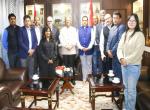
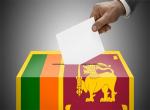
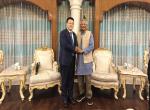
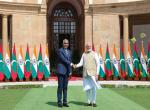

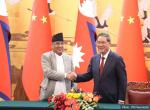
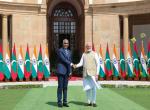
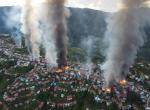
Post new comment